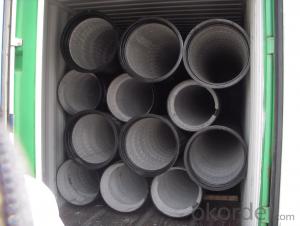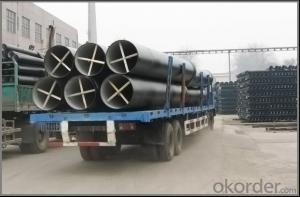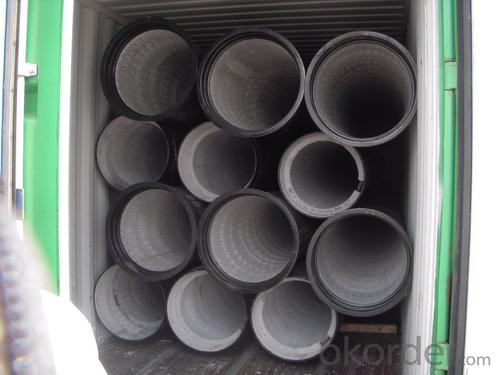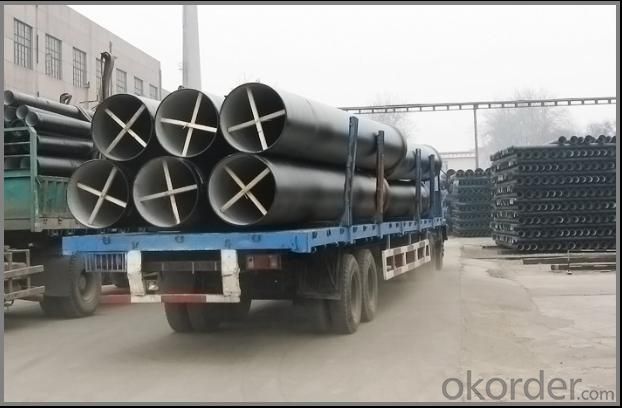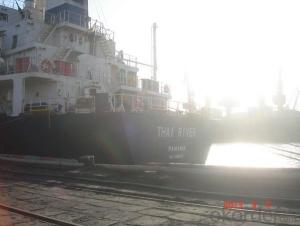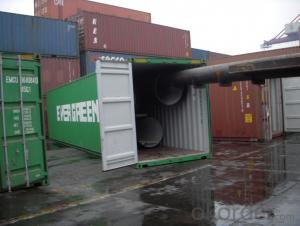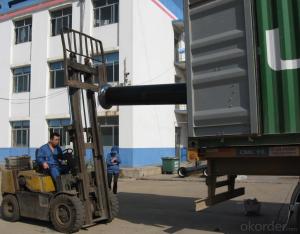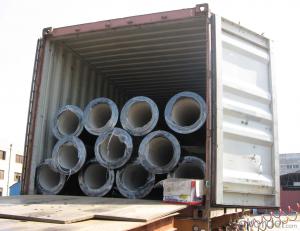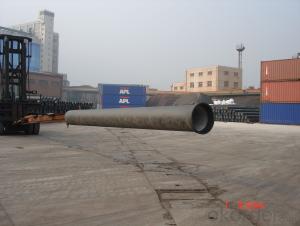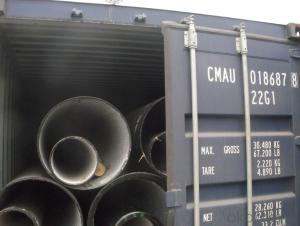DUCTILE IRON PIPE AND PIPE FITTINGS C CLASS DN500
- Loading Port:
- Tianjin
- Payment Terms:
- TT or LC
- Min Order Qty:
- 23 m.t.
- Supply Capability:
- 3000 m.t./month
OKorder Service Pledge
OKorder Financial Service
You Might Also Like
· Material : Ductile Cast Iron
· Size Range : DN 80mm to DN 2000mm
· Unit Effective Length : 6m or 5.7m
· Manufacture Standard: ISO 2531:1998/ EN 545:2006/EN 598:2007
· Annual capacity : 200,000 tons
· Coating Exterior: Zinc 130g/m2 according to ISO 8179-1 and bitumen coating 70 microns.
· Cement Interior: Portland Cement/ High Alumina Cement/ Sulphate Resisting Cement Lining according to ISO 4179
· Special requirements on external coating and internal lining can be applied
· We also provide accessories such as SBR/EPDM rubber gaskets, lubricant paste, pipe caps, PE sleeves, etc.
Additional Parts:
Each pipe is strictly inspected according to related standard to ensure permanently high performance.
Easy Installation at site and service free for life
Long Service Lifespan
Quotation will arrive you within 24hours once we get your inquiry.
We guarantee offering you a competitive price.
A copy of original inspection reports of pipes will be offered after shipment.
- We will follow-up the delivery progress after shipment effect and update to the customer on weekly basis.
- Q: What is the expected joint tightness for ductile iron pipes?
- The expected joint tightness for ductile iron pipes is typically high. Ductile iron pipes are known for their strong and durable nature, making them highly resistant to leaks and joint failures. The joints in ductile iron pipes are usually designed to provide a secure and tight connection, ensuring minimal water or fluid loss. Various joint types are commonly used for ductile iron pipes, including mechanical joints, restrained joints, and push-on joints. Each of these joint types is designed to provide a reliable seal and prevent any leakage. Mechanical joints use a mechanical gland and rubber gaskets to create a tight seal. These joints require a certain level of torque during assembly to ensure proper compression and sealing. Restrained joints, on the other hand, are specifically designed to withstand external forces, such as soil movement or pressure, and maintain their tightness. These joints typically use a mechanical restraint system, such as a key-locking mechanism, to prevent joint separation. Push-on joints are the easiest to install and provide a secure seal by utilizing a rubber gasket that is compressed when the pipes are pushed together. These joints are commonly used in smaller diameter pipes where the external forces are minimal. Overall, ductile iron pipes are expected to have a high level of joint tightness, ensuring reliable and leak-free performance in various applications, including water distribution, wastewater systems, and industrial piping networks.
- Q: Can ductile iron pipes be used for bridge piers?
- Bridge piers can indeed utilize ductile iron pipes. These pipes possess remarkable strength and durability, rendering them suitable for various purposes, bridge construction included. Their resistance to corrosion is exceptional, and they withstand heavy loads with ease, making them a dependable choice for supporting bridge piers. Moreover, ductile iron pipes offer convenient installation and maintenance, which can be advantageous in bridge construction endeavors. Nonetheless, it is crucial to account for the specific requirements and design specifications of the bridge prior to selecting ductile iron pipes as the material for its piers. Thorough engineering evaluation and consideration of factors like load capacity, soil conditions, and environmental elements are indispensable for guaranteeing the suitability and safety of employing ductile iron pipes for bridge piers.
- Q: What quota can be used for the installation of DN300 ductile iron pipes?
- Moreover, the ball tube is generally 5.5 meters long or 6 meters, if the length of the bridge is too long, to use the casing, the casing must also be fixed, and so on.
- Q: Ductile iron pipe converter, steel transition DN100 turn 100, what is the specific accessories name? Can you supply photos?
- 1. corrosion resistance: in addition to some strong oxidizing substances, polyethylene material pipe fittings can effectively prevent oxidation material corrosion.2., leakage prevention: the use of hot melt and electric melting technology, the pipe interface can be tightly linked together, there is no leakage.
- Q: Are ductile iron pipes resistant to abrasion?
- Indeed, abrasion is no match for ductile iron pipes. Ductile iron, a form of cast iron fortified with magnesium, undergoes this treatment to enhance its robustness and malleability. Consequently, it becomes exceptionally resistant to deterioration, including abrasion. These pipes find widespread use in scenarios where they encounter abrasive substances like sand, gravel, and other particles during fluid transportation. The material's remarkable capacity to endure abrasion guarantees its endurance and dependability across diverse sectors, ranging from water distribution and sewer systems to industrial pipelines.
- Q: What's the function of the cement mortar lining of ductile iron pipes?
- Active protection is superior to barrier coating, cement mortar lining, and a stable hydroxide film formed on the surface of ductile iron and steel pipe to form a protective layer. This kind of protective coating has excellent antiseptic properties because they spontaneously protect themselves even in discontinuous linings. A polymer in sharp contrast, such as an epoxy lining, is also barrier coating, but only if 100% is applied without leakage. Any interruption or leakage will cause corrosion.It has been documented that cement mortar and cement mortar have been applied to the field of water transportation and can meet the water quality standards for a long time. Some standards still apply to the world. Cement mortar does not support microbial growth. In the case of corrosive water or low flow rate (prolonged stagnation), it is better to use cement mortar lined pipes because it can maintain high pH values in the pipe. This does not cause health problems and can be prevented by very simple sealed coating methods. The natural characteristics of the sealing coating provide the best protection for the inner wall of the pipe, while ensuring that all the water quality indexes meet the quality requirements, low cost and high efficiency.
- Q: DN300 how long is it for water polo and iron pipes?
- Cast iron pipe (Cast Iron Pipe) with the cast iron casting pipe cast iron pipe for water supply and drainage gas pipeline pipe fittings including cast iron casting with fatigue strength by continuous cast iron pipe from the cast iron pipe from the cast iron pipe sand metal two according to material with grey cast iron pipe, ductile iron pipe at the interface with flexible sealing interface LAN interface, self anchored interface, interface of the rigid flexible cast iron pipes rubber ring;
- Q: What is the expected joint deflection of ductile iron pipes?
- Various factors, such as the pipe diameter, joint type, and installation conditions, influence the expected joint deflection of ductile iron pipes. Generally, ductile iron pipes are designed to allow for some deflection at the joints to accommodate flexibility and movement. The American Water Works Association (AWWA) offers guidelines for the maximum allowable joint deflection of ductile iron pipes. According to AWWA C151/A21.51, the joint deflection should typically not exceed 3 degrees or 1% of the nominal pipe diameter, whichever is greater. It is crucial to ensure that the joint deflection remains within the specified limits to maintain the structural integrity and performance of the pipeline system. Excessive joint deflection can result in leaks, failures, and reduced pipe lifespan. To accurately determine the expected joint deflection for a specific installation, it is recommended to refer to the manufacturer's specifications and guidelines. These specifications may vary based on pipe size, joint type, and other factors. Seeking guidance from a qualified engineer or directly contacting the manufacturer can provide precise information tailored to the project requirements.
- Q: What are the interface forms of ductile iron pipes? The best drawings are available. Thank you
- T interface type sealing ring is a self sealing rubber ring, when the pipe internal pressure increases, the contact pressure between the seal and the pipe increases, T interface can not only allow the deflection angle of the axial displacement, and convenient for installation. When the T type interface is installed, the sealing of the rubber ring can be ensured as long as the socket is simply loaded into the socket and the rubber ring is pressed tightly. This kind of interface has the advantages of reliable sealing, good seismic resistance and corrosion resistance, and it is a better interface.
- Q: Are ductile iron pipes suitable for installation in areas with high soil settlement and consolidation?
- Ductile iron pipes are commonly used in areas where there is significant soil settlement and consolidation. One of the main advantages of these pipes is their ability to withstand external loads and accommodate ground movement. Compared to other pipe materials, ductile iron pipes are known for their strength and flexibility, making them more resistant to soil settlement and consolidation. They have a higher tensile strength and can withstand heavy loads and ground vibrations without cracking or breaking. This makes them suitable for areas with soil prone to settlement and consolidation. Moreover, ductile iron pipes have a high resistance to corrosion and can withstand aggressive soil conditions, which are often found in areas prone to settlement and consolidation. They are also less likely to be damaged by external factors such as roots or rocks, making them even more suitable for installation in such areas. However, it is important to consider the specific conditions of the site and consult with engineers or experts who are familiar with the local soil conditions. Factors such as the magnitude and rate of settlement, soil type, groundwater levels, and construction methods should be taken into account when determining whether ductile iron pipes are appropriate for installation in areas with high soil settlement and consolidation. In conclusion, ductile iron pipes are generally a suitable choice for installation in areas with high soil settlement and consolidation. Their strength, flexibility, resistance to corrosion, and ability to withstand external loads make them a reliable option for these conditions. Nevertheless, it is always recommended to assess the specific site conditions and consult with professionals to ensure the most appropriate pipe material is selected for each project.
Send your message to us
DUCTILE IRON PIPE AND PIPE FITTINGS C CLASS DN500
- Loading Port:
- Tianjin
- Payment Terms:
- TT or LC
- Min Order Qty:
- 23 m.t.
- Supply Capability:
- 3000 m.t./month
OKorder Service Pledge
OKorder Financial Service
Similar products
Hot products
Hot Searches
Related keywords
